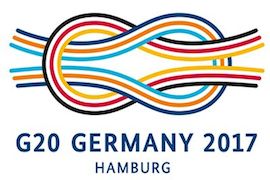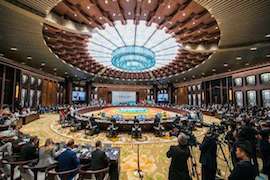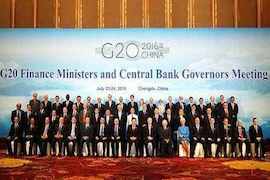Global Governance
Your Present Location: PROGRAMS> Global Governance-

Risks of global economic downturn increasing
World economy is recovering, but the process is slow and unbalanced, China`s vice finance minister Zhu Guangyao said here Friday.
2016-12-06 -

China continues to champion global governance in int`l forums
Since the 2014 Asia-Pacific Economic Cooperation (APEC) summit in Beijing, China has continuously highlighted global governance at such different international occasions as the Hangzhou G20 summit in September and the just-concluded APEC summit in Lima.
2016-11-24 -

G20 pledges African industrialization support
During its summit in Hangzhou earlier this month, the G20 announced its first Initiative on Supporting Industrialization in Africa and LDCs. The 20 biggest economies in the world showed their "collective support" for the industrialization of the global south, and endorsed it as the solution for development challenges in Africa.
2016-09-26 -

John Ross: Neoclassical Models not suited to China
G20 summit was a big success in terms of China setting the international economic agenda. China also took some significant steps toward its goal of the G20 playing a more strategic role in global economic policymaking.
2016-09-20 -
Chinese presidency boosts G20 as possible new model of global governance
The G20 Summit held in the eastern Chinese city of Hangzhou showed the strength and quality of China`s leadership, and proved to be a possible new model in terms of global economic governance, according to Italian experts.
2016-09-19 -
China embraces summit diplomacy in addressing global challenges
As the world lauded the achievements of the G20 Hangzhou summit earlier this month in addressing a sluggish world economy, China`s new approach to foreign affairs became evident: summit diplomacy.
2016-09-18 -
Reviving global investment, trade needs action
To revitalize the growth engines, G20 members agreed to ratify the Trade Facilitation Agreement by the end of 2016, and pledged to use the newly-established Trade and Investment Working Group (TIWG) to identify new approaches that will help spur global trade growth, and enhance investment policy coordination.
2016-09-14 -
G20 has become more than a firefighter
The 11th G20 Summit in Hangzhou saw groundbreaking achievements, President Xi Jinping said in his concluding remarks on Sept 5. Leaders of major economies reached consensus on seeking workable solutions for global economic growth, and strengthening policy coordination. Compared with previous summits, the Hangzhou meeting undoubtedly bore more fruit.
2016-09-12 -
China commits to freedom for trade, investment
China is committed to advancing the freedom of global trade and investment and hopes that not just China but also Western countries expand access for foreign investment, experts noted Tuesday.
2016-09-07 -
A view from Beijing--China`s priorities
The G20 - comprising 19 countries and the EU, with representatives from the Bretton Woods institutions and established just at the turn of the century, provides a new way forward for transnational governance that works for not only China, but also for 19 other major economies.
2016-09-07 -
China commits to freedom for trade, investment
China is committed to advancing the freedom of global trade and investment and hopes that not just China but also Western countries expand access for foreign investment, experts noted Tuesday.
2016-09-07 -
China`s resolution gives hope to world economy
China`s ambition to advance reform and maintain medium to high growth has injected hope and stability into the world economy, experts have observed.
2016-09-07 -
Enthusiastic keynote speech endorses globalization trend
President Xi presented China’s strategies to provide impetus for future economic growth such as; innovation driven development strategy to provide stronger and new growth drivers, green development, promoting equity and further opening to achieve greater mutual benefit.
2016-09-07 -
G20 in China, a new launchpad for global economy
China hopes the Hangzhou summit will come up with "an integrated pre1111ion to address both the symptoms and root causes so that the world economy could move along a path of strong, sustainable, balanced and inclusive growth," President Xi Jinping said while addressing the opening of the summit.
2016-09-06 -
G20 needs China’s thought leadership
Group of 20 (G20) leaders are aware the global economy has not overcome the effects of the international financial crisis. There is a wide understanding that without China`s continued economic development since that crisis began anaemic global growth would be even worse.
2016-09-06 -
Hangzhou G20 Summit - Leaders’Communique
Leaders of the Group of 20 (G20) major economies on Monday adopted a leaders` communique at the end of the 11th G20 summit in China`s eastern city of Hangzhou.
2016-09-06 -
Wang Wen: China hosts G20 summit, starting new journey for world`s growth
Xi proposed that the summit should strengthen coordination of macro-economic policies, facilitate economic expansion worldwide, safeguard financial stability, make innovations on growth patterns, tap new potential, optimize global economic governance and make institutional improvements.The summit should also increase the openness of the world economy, facilitate trade and investment and boost inclusive development.
2016-09-05 -
Feride Inan: Innovation meets global policy in the G20
The new global context calls for integration of technology and innovation into all aspects of global economic debate. The G20 may very well be the right place to steer a global innovation agenda to promote inclusive and sustainable economic growth and development.
2016-09-05 -
Xi takes world`s center stage at G20 summit
It would seem that the West Lake boat trip with Xi being flanked by leaders of both developed countries and emerging markets could signal an increasingly important role China seeks on the world stage: a bridge between the developed and developing nations.
2016-09-05 -
China plays a key role in setting G20 agenda
The G20 summit meets against the backdrop of two interrelated global issues.First,since the international financial crisis global growth has been slow. Second, asa result social and geopolitical crises have persisted. China’s proposals for the G20 summit – an innovative, invigorated, interconnected and inclusive economy –simultaneously and in an integrated way address both issues.
2016-09-05
























































































 京公网安备 11010802037854号
京公网安备 11010802037854号





